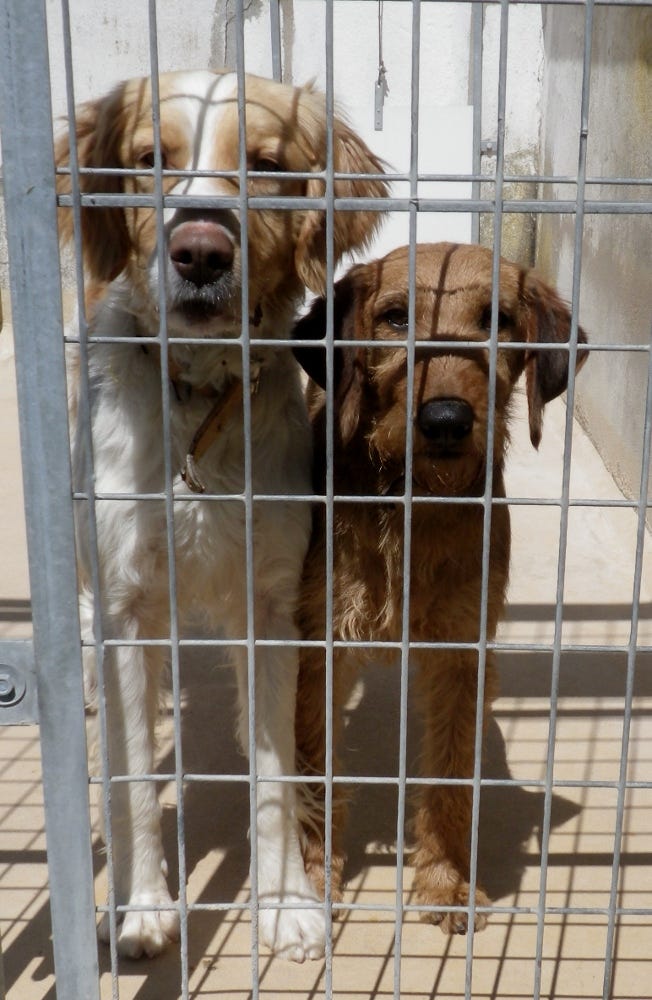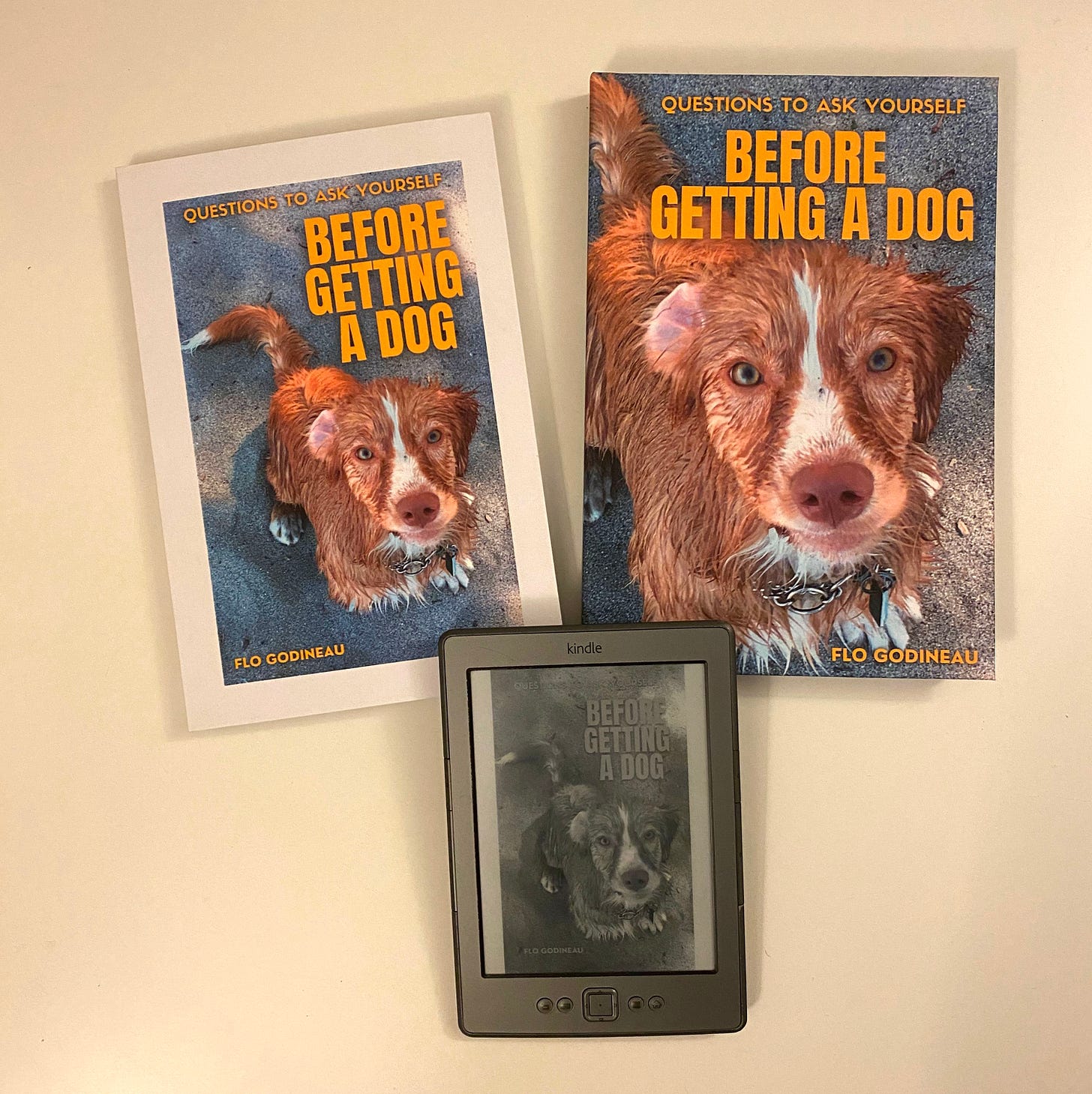#22 - Five questions to ask yourself before getting a dog
Making a life-changing decision without overwhelm
It’s the time of year when many of us look ahead, and start planning for what we want to happen next. Do your plans for 2024 include welcoming a new dog into your home? That’s fantastic!
It is a big decision and worth taking some time to reflect before committing to it. In 2022 I created a guided journal to help future pet parents through the process. You can find Questions to Ask Yourself Before Getting a Dog here if you are interested.
BUT FIRST! Let’s dive into 5 of the most relevant questions you can ask yourself.
1. Why do you want to get a dog?
2. How much time will you be able to dedicate to your future dog?
3. How much money can you comfortably spend on your future dog?
4. What kind of dog would best fit your lifestyle?
5. When the reality of living with a dog doesn’t meet your expectations, how will you best support yourself and your dog?
1. Why do you want to get a dog?
Getting a dog might be a dream you’ve had for decades or something you’ve just realized you want to do. Either way, we need to remember that by getting a dog, we are welcoming a living being into our home. Dogs have their own needs and their own desires that won’t always align with what we expect or want. Dogs need to adapt to living in a human world, in their new homes, yes, AND we need to adapt to our own dogs.
If you’re reading this article, you’re already ahead of the game, because it means you are already putting thought into the decision and getting a dog should not be an impulse choice.
Asking yourself why you want to get a dog will help you avoid some pitfalls, like getting a dog purely for aesthetics reasons or as a surprise gift for a loved one. If you write your reasons down it can serve as a reminder on tough days where your new dog won’t stop whining and you forget why you’ve made such a decision.
Getting a dog can be an absolutely wonderful thing, it’s also a life-changing choice that should not be taken lightly. So why do *you* want to get a dog?
2. How much time will you be able to dedicate to your future dog?
Dogs often require a lot of time and attention, especially in the first few months following their arrival. Adult and senior dogs need to be taught house rules and how best to fit into your life. Puppies need to be taught EVERYTHING. Living in a world of humans does not come naturally for dogs, and there are a lot of natural dog behaviours that humans don’t deem acceptable. The time you invest with your dog, especially at the beginning, will help you build a harmonious life in your future.
Then, there is the time you will need to dedicate to your dog daily, for walks and exercise, play, feeding, etc.
How much time and energy will you be able to dedicate to your dog for the following?
- Walks (daily)
- Training (daily to start with)
- Grooming (brushing, nail trims, …)
- Medical care (brushing teeth, vet visits)
- Playing
- Couch cuddles
- Mental and physical exercise
3. How much money can you comfortably spend on your future dog?
Welcoming a new dog in your life can be expensive, between upfront costs, ongoing costs, and unexpected medical costs. Getting a better understanding of the costs involved in taking care of a dog, and taking an honest look at your financial situation will help you to:
Choose a dog that better fits your budget.
Reduce anxiety because you are prepared for emergencies.
Keep unpleasant financial surprises to a minimum.
Increase joy because you’re saving money for adventures with your dog.
If you want to take great care of your (future) canine friend with less stress, ask yourself how much money you can comfortably spend on your dog?
for the regular care of your future dog, e.g. food, poop bags, flea and deworming, vaccinations and boosters, training classes (optional), health insurance (optional), grooming (cost will depend on the type of dog), dog license…
for the upfront or one-time expected costs, e.g. leash, collar, identification, crate, toys, other gear, sterilisation, aging costs…
for the unexpected costs, e.g. accidents or medical issues.
If you want to dive deep into this subject I recommend you check out my free budgeting mini-course, Can I afford to get a dog?
4. What kind of dog would best fit your lifestyle?
When you picture your new dog, what dog do you imagine? Think about their temperament, size, breed, age, energy levels, and appearance.
Then do the same exercise, focusing on the kind of dog that would best fit your current lifestyle. It’s easy to get caught up in a perfectionist fantasy and imagine that -once you have a new dog- your life will be totally different and you will have the energy, patience and time to do ALL THE THINGS. It’s best to assume that you will be the same person, with the same job and emotional capacity as you have now, or maybe even less if you are busy potty-training your new puppy and operating with a lack of sleep. Will you really have the energy to deal with the challenges that come with training a puppy (short nights, house training, teething, etc), or take care of a working dog with high exercise needs?
Figuring out what kind of dog would best fit your lifestyle means looking at a typical day in the life of your future dog: how long they will spend alone, the amount of physical and mental exercise they will have access to, the other members of the household and the environment they will live in. Looking back at your answers for the first three questions will also help you narrow down choices: e.g. puppies cost more in their first year and larger dog require a higher food budget.
Here are the elements you need to consider: Age, Size, Energy levels, Coat type, Temperament, Established behaviours.
5. When the reality of living with a dog doesn’t meet your expectations, how will you best support yourself and your dog?
Welcoming a dog in your life is a wonderful adventure, AND, as with any life-changing adventure, it can be stressful at times. While it’s important to choose the right dog and get everything ready for the big day of their arrival, it’s as important to prepare yourself.
How can you best support your future self when they are feeling a bit overwhelmed as they are taking care of your new dog? Here are a few ideas:
List the reasons why you decided to get a dog, as a reminder that the hard work of the first few months is worth it;
Get more knowledgeable about dog training, while keeping in mind that you will learn the most from practice;
Reach out to your support network: are there people in your social circle who would happily take care of your new dog for a few hours or a day to give you a break?
Talk to the other members of your household and discuss how you will share responsibilities;
Research dog trainers in your area who match with your values when it comes to training;
Remember to be kind to yourself.
Getting a new dog is a big decision, and it’s not for everyone at any given time. If you have decided not to welcome a dog in your life just yet, and want to find ways to spend more time with dogs, you can research options like dog-sitting for a friend, volunteering at a shelter, offering to walk your neighbour’s dog…
If you are still on the fence and think more reflection time would help, check out my guided journal Questions to Ask Yourself Before Getting a Dog. And if you are ready to embark on the adventure and are scrolling petfinder as we speak, the guided journal will also help you prepare for your new dog’s arrival.
Have fun imagining and making your dream of getting a dog a reality!




